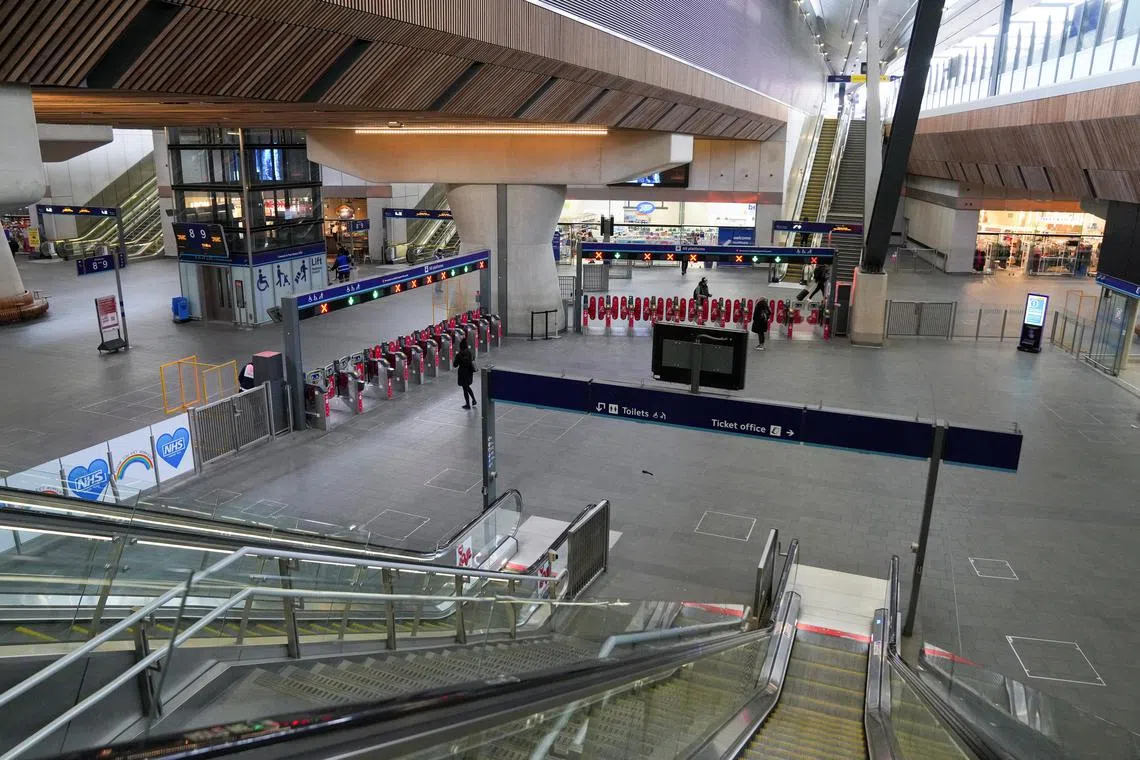London’s restaurants are emptiest since Omicron due to crippling strikes
Sign up now: Get ST's newsletters delivered to your inbox

A nearly empty London Bridge station. Restaurant bookings have collapsed, as strikes force Londoners to stay put.
PHOTO: REUTERS
LONDON – London’s pubs and restaurants that survived Covid-19 and the widespread adoption of working-from-home are now facing another threat – persistent train strikes.
Restaurant seating on the first day of rail strikes this week collapsed to levels not seen since the Omicron variant swept through London, when face masks were mandatory on public transport and the government was telling people to avoid the office.
Bars and convenience food outlets in central areas are also suffering.
Office occupancy in the capital has fallen to around 20 per cent compared to more than 50 per cent at times last week before the strikes.
Rail workers are demanding steeper raises in light of Britain’s double-digit inflation, and resisting some post-Covid reforms to working practices.
“It’s creating havoc in everyone’s lives, and it’s terribly difficult to run a business,” Mr Julian Metcalfe, founder and chief executive of Asian food chain Itsu, told Bloomberg News. He said trade in some branches was down 30 per cent.
Trade body UKHospitality has estimated that the strikes will cost the sector £1.5 billion (S$2.5 billion) in revenues across Britain.
Mr Phil Urban, chief executive of FTSE 250 business Mitchells & Butlers, which owns pubs and city centre brands such as All Bar One, said the strikes had “massively impacted” Christmas bookings – compounded by the freezing weather.
He said there were “definitely more no-shows” than in 2021, when the Omicron variant prompted customers to cancel bookings.
Gas Station, a bar near King’s Cross, has seen takings plummet 70 per cent compared to last week, while Harts Group, which owns restaurants and bars including Barrafina and Quo Vadis, has seen a roughly 50 per cent drop in reservations and about the same rate of cancellations of private events.
“We sort of feel like punch-drunk boxers,” said Mr Crispin Somerville, Harts’ managing director. “There’s been the best part of three years of dramatic impact on business.”
Employers are also having to pay for taxis to take staff home, according to Mr Rik Campbell, co-founder of Indian restaurant chain Kricket. “The strikes are costing the country billions, and we can’t afford it,” he added.
Strikes are sweeping Britain as workers in various sectors – including the health system, Royal Mail and civil service, as well as transport – rebel against real-terms pay cuts.
The government insists it cannot allow higher raises without the risk of embedding inflation and making the cost of living crisis even worse.
Mr Metcalfe said he did not know how the situation could be resolved.
“Obviously you can’t just pay up. Otherwise, the whole country will be on its knees by Easter. There would be nothing left,” he said. “You have to be reasonable, but what is reasonable?” BLOOMBERG


